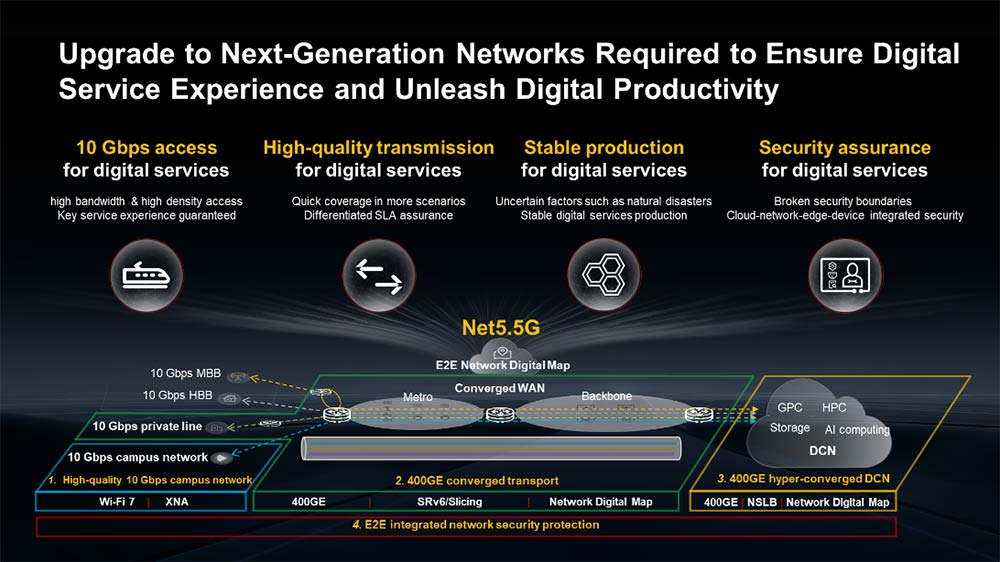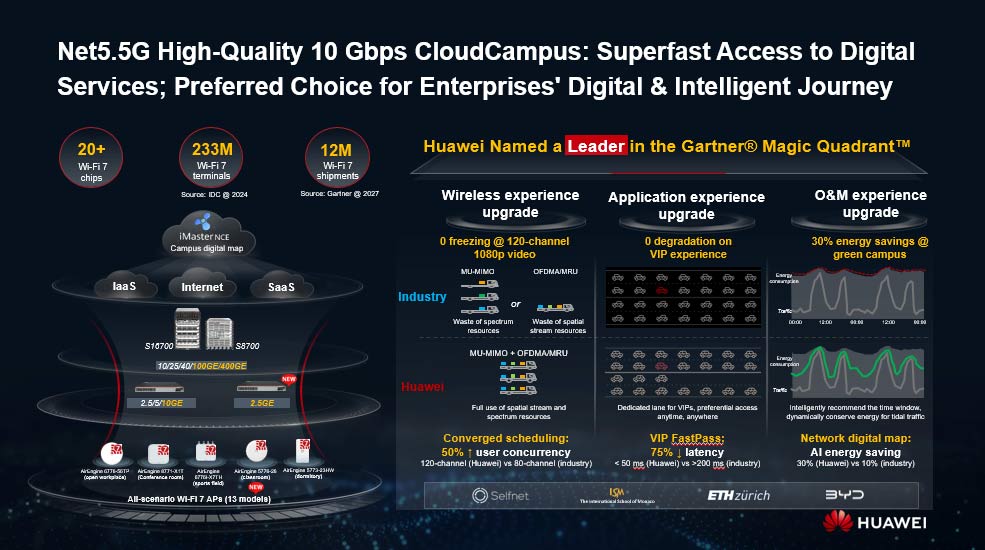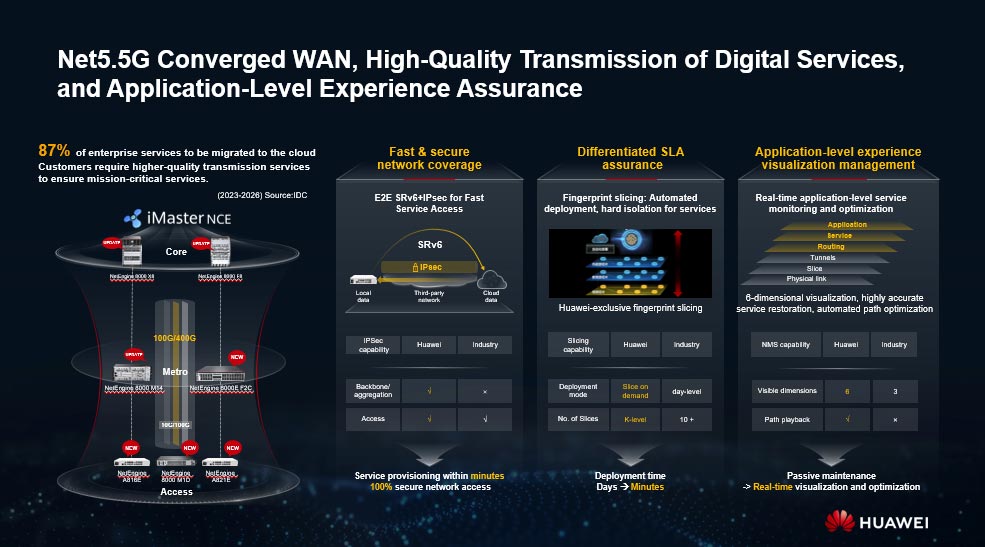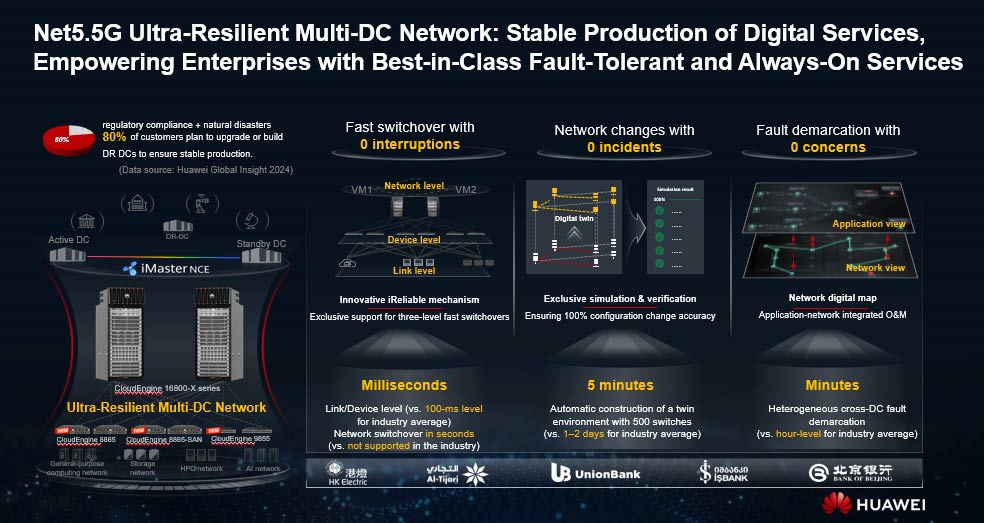Produkte, Lösungen und Services für Unternehmen
Smartphones, PCs & Tablets, Wearables, mobiles Breitband und mehr
Über Huawei, Nachrichten, Veranstaltungen, Brancheneinblicke und mehr
Nowadays, intelligent transformation has become a buzzword in all industries. In essence, intelligent transformation is to leverage a wide array of emerging intelligent technologies to offer more intelligent digital services, in turn helping all industries improve efficiency and unleash digital productivity.
Sora, a recent game changer for text-to-video generation, for example, offers AI-Generated Content (AIGC) services. By introducing Sora, producers in the film and television industry can easily craft a lifelike 60-second video after a text prompt. This translates into unprecedented levels of video generation efficiency and digital productivity.
However, in many real-world cases, digital services are restricted by poor network quality, and intelligent technologies are not fully converted into digital productivity. As such, improving the network quality has become the key to maximizing digital productivity.
An end-to-end process for digital services covers many aspects, including stable production, high-quality transmission, 10 Gbps access, and security assurance for digital services. We need to comprehensively improve network capabilities to ensure full-process optimal experience of digital services and fully unleash digital productivity.

• 10 Gbps access for digital services: High-density and heavy-traffic services, such as video conferencing and Virtual Reality (VR) teaching, drive today's campus networks to upgrade to 10 Gbps. This upgrade paves the way for emerging use cases and facilitates inclusive access to digital services.
• High-quality transmission for digital services: More industries ramp up their intelligent transformation. This requires Wide Area Networks (WANs) to enable fast and secure coverage while ensuring high-quality and flexible transmission, as well as differentiated experience. In this way, digital services can be transmitted on demand to all industries.
• Stable production for digital services: Disaster Recovery (DR) data center deployments gain momentum due to more external factors such as natural disasters and industry supervision. Against this backdrop, Data Center Networks (DCNs) must be more stable and reliable to ensure stable production for digital services.
• Security assurance for digital services: As a myriad of branches move to the cloud, security boundaries become blurred. This puts a huge strain on the previous centralized security protection at the headquarters. As such, end-to-end network security protection is required to ensure the security and reliability of digital services.
Net5.5G is the next generation of IP networks. It ensures end-to-end experience of digital services and maximizes digital productivity by upgrading to high-quality 10 Gbps campus networks, 400GE converged WANs, super-connectivity 400GE data center networks, and E2E integrated network security.
In response, Huawei launched four all-new Net5.5G Intelligent Cloud-Network solutions this year: Net5.5G High-Quality 10 Gbps CloudCampus, Net5.5G Converged WAN, Net5.5G Ultra-Resilient Multi-DC Network, and Net5.5G HiSec SASE. These new offerings help enterprises worldwide to ensure the quality of digital services and maximize digital productivity.
In 2024, campus networking officially enters the Wi-Fi 7 era. Chip vendors such as Intel, Qualcomm, and Broadcom have released over 20 Wi-Fi 7 chips. IDC predicts that there will be 233 million Wi-Fi 7 terminals in 2024, and mainstream AP shipments will quickly change from Wi-Fi 6/6E to Wi-Fi 7. Gartner also forecasts that Wi-Fi 7 AP shipments will reach 12 million by 2027, accounting for 65% of the total.
To embrace the Wi-Fi 7 era, Huawei's High-Quality 10 Gbps CloudCampus Solution brings three types of experience upgrade.

• Wireless experience upgrade: Huawei is the first in the industry to release all-scenario Wi-Fi 7 APs, 13 models in total. These new APs cover all indoor and outdoor scenarios such as offices, conference rooms, classrooms, dormitories, and outdoor spaces. At an Internet company, for example, terminals per person increase from 1 or 2 to 4 or 5, and users per AP grow from 30 to 120. However, Wi-Fi 6 APs in the industry support only 30 concurrent channels of HD video conferencing. And even flagship Wi-Fi 6E APs support only 80 concurrent channels. In contrast, Huawei Wi-Fi 7 APs support 120 concurrent channels at most. This is because Huawei offers unique converged scheduling solution that increases user concurrency by 50%. The resulting benefits include always-smooth 120-channel HD video conferencing on each AP during peak hours.
• Application experience upgrade: Huawei's unique VIP assurance solution ensures no experience degradation for VIPs such as CXOs even when many users concurrently use the network. Plus, Huawei's unique VIP FastPass technology provides dedicated lanes for VIPs, so that they enjoy high-priority access anytime, anywhere. More importantly, the latency for VIPs is reduced by 75%, and their experience is not degraded.
• O&M experience upgrade: Huawei offers a unique network digital map that can visualize energy consumption and energy efficiency in real time from many dimensions, such as the entire network, per site, per floor, and per device. It fully understands the tidal Wi-Fi traffic patterns and uses AI grouping algorithms to intelligently recommend the time window for energy saving. In this way, energy saving policies are automatically enforced to achieve dynamic energy saving.
IDC predicts that from 2023 to 2026, the percentage of enterprise services migrated to the cloud will increase from 63% to 87%. As customers' mission-critical services are migrated to the cloud, networks need to provide higher-quality transmission to ensure service experience and data security and reliability.
For example, government video conferences require low-latency and high-bandwidth networks to ensure conference experience. Another example is the railway ticket system. During peak hours, packet loss on the network will cause ticket purchase failures. Therefore, services need to be protected against traffic bursts.
That's where Huawei's Net5.5G Converged WAN Solution can help. This future-proof solution provides differentiated service transport and ensures experience for customers.

• Fast and secure network coverage at the network layer: More than 50% of government and financial WANs involve leasing third-party links. When traversing third-party networks, data needs to be encrypted to ensure data security. Huawei is the only vendor that supports end-to-end IPsec and SRv6, empowering customers with quick network access and end-to-end security encryption. Unlike Huawei, most vendors in the industry only support IPsec at the end and cannot implement end-to-end secure networking. For example, a government agency in Latin America requires fast access of new departments. After meticulous consideration, they chose Huawei's E2E SRv6 and IPsec solution to enable link provisioning within minutes, ensure 100% secure data traversal over the public network, and achieve network coverage of over 6000 branches within three years.
• Upgraded slicing at the service transport layer: Unique to Huawei, the planning-free, slice ID-based slicing solution allows slices to be deployed based on user IDs and provisioned on demand. By contrast, traditional slicing solutions require days for slice deployment.
• Upgraded network digital map at the management layer: Traditional O&M methods only offer insight into the tunnel layer. However, multiple applications exist in the same tunnel. When the quality of a specific application deteriorates, the fault cannot be visualized or located, and the tunnel status is displayed as normal even if user experience is poor. This causes customer complaints, driving O&M personnel to locate the fault point by point. Huawei's Network Digital Map 2.0 supports application-level service visualization and optimization. It can accurately restore customer service experience and automatically locate and optimize congestion or failure points.
In the data center network field, the rapid development of digital transformation has led to enterprise data centers focusing on DR. The need for enterprise survival, regulatory compliance, and protection against natural disasters are driving the upgrade of DR capabilities in enterprise data centers. According to statistics, almost 80% of customers plan to build or upgrade DR data centers (DCs) outside of their primary DCs to ensure stable production.
This year, Huawei has introduced the Ultra-Resilient Multi-DC Network Solution, which is built on the high-performance CloudEngine series switches and the iMaster NCE intelligent management and control platform. This solution offers enterprise customers three essential capabilities: fast switchover with zero interruptions, network changes with zero incidents, and fault demarcation with zero concerns.

Taking a bank project in Nigeria as a case study, Huawei devices boast a link switchover time of under 10 ms, guaranteeing uninterrupted service during the process. In contrast, peer vendors' devices take about 100 ms to switch over, and their reliability is only one-tenth of Huawei's. Moreover, network switchover can be implemented within seconds in the event of device failure. The iReliable three-level fast switchover mechanism, exclusive to Huawei, ensures a superior customer service experience across multiple dimensions.
In an early morning change at a large Chinese commercial bank, a network administrator mistakenly deleted several switch ports, causing a 55-minute disruption in mobile payments and a CNY6 million bonus loss for the network department. To prevent such similar incidents from occurring in the future, the bank collaborated with Huawei to introduce the simulation and verification function. With this function, the possible impact can be evaluated through simulation in advance and the change result verified after the event. The network with 500 switches can automatically build a twin simulation environment within 5 minutes, a process that typically takes 1 to 2 days in the industry. Since using this function, the bank has successfully made thousands of changes throughout the year without any further incidents.
As China's largest city commercial bank, Bank of Beijing has adopted a two-site three-DC architecture. Currently, the customer has five management platforms on their live network, resulting in siloed data that requires manual integration. Additionally, network and application O&M are separated, causing difficulties in multi-vendor cross-DC fault locating scenarios and hindering the troubleshooting process. However, thanks to Huawei's network digital map functionality, integrated O&M of applications and networks is now possible. It is like Google Maps for a network. This allows for the display of clear E2E traffic paths, and in the event of a fault, the fault point can be located within 3 minutes, greatly benefiting the customer.
Generally, we centrally access enterprise services from the headquarters data center. Enterprises gradually move their branches to the cloud. Currently, 60% of enterprises access public cloud services through the Internet. Enterprise branches access the public cloud through the Internet from the headquarters. This cannot ensure the service experience. Therefore, enterprise branches need to directly access public cloud services through the Internet. This enlarges the enterprise security exposure. The headquarters has sufficient devices and personnel for security protection. In contrast, branches use weak single-point protection and cannot provide the same protection level as the headquarters. Therefore, we urgently need to upgrade the security defense capabilities of branches.
Huawei's HiSec SASE Solution stands out with cloud-network-edge-endpoint integrated intelligent protection, providing consistent security assurance for the headquarters and branches, thereby safeguarding enterprise branches. This future-oriented solution features unrivaled comprehensiveness, efficiency, and security, and is applicable to a wide range of scenarios such as remote office, multi-branch networking, and endpoint security protection. It is ideal for safeguarding the digital-intelligent transformation of industries such as government, finance, and large enterprise.

Looking ahead, Huawei will continue to enhance the competitiveness of Net5.5G Intelligent Cloud-Network offerings. Doing so will pave the way for revolutionizing network capabilities, optimizing the quality of digital services, maximizing digital productivity, and ultimately creating greater value for customers and the entire industry.
Disclaimer: The views and opinions expressed in this article are those of the author and do not necessarily reflect the official policy, position, products, and technologies of Huawei Technologies Co., Ltd. If you need to learn more about the products and technologies of Huawei Technologies Co., Ltd., please visit our website at e.huawei.com or contact us.